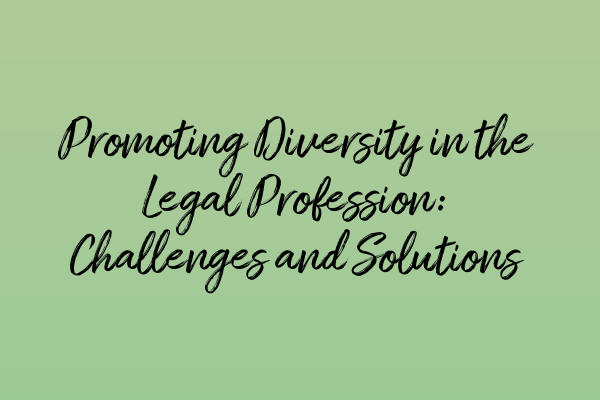Promoting Diversity in the Legal Profession: Challenges and Solutions
Introduction
Diversity and inclusion are essential for any profession, including the legal industry. However, the legal profession has traditionally been dominated by a homogenous group, lacking representation from various backgrounds. Promoting diversity in the legal profession is crucial for ensuring equal access to justice and providing a more inclusive and fair legal system. In this blog post, we will explore the challenges faced in promoting diversity and present solutions to overcome them.
Challenges in Promoting Diversity
1. Lack of representation
One of the major challenges in the legal profession is the lack of representation from underrepresented groups. Historically, certain demographics have been underrepresented, including women, ethnic minorities, individuals with disabilities, and those from low-income backgrounds. This lack of representation perpetuates biases and hinders equal opportunities for all.
2. Implicit biases
Implicit biases are unconscious prejudices that affect decision-making processes. These biases can have a significant impact on hiring practices, promotions, and opportunities within the legal profession. Overcoming implicit biases is crucial to ensure equal opportunities for individuals from diverse backgrounds.
3. Limited access to education and resources
Education and resources play a vital role in shaping the legal profession. However, individuals from underrepresented groups often face limited access to quality education and resources, which hinders their ability to enter and succeed in the legal field. Closing the education gap is essential to promote diversity in the legal profession.
Solutions for Promoting Diversity
1. Implementing diversity quotas and targets
Law firms, legal organizations, and regulatory bodies can implement diversity quotas and targets to ensure a more diverse representation within the legal profession. By setting specific goals and holding organizations accountable, we can encourage the recruitment and promotion of individuals from underrepresented groups.
2. Promoting unconscious bias training
Organizations should provide unconscious bias training to legal professionals to raise awareness about implicit biases and their impact. By recognizing and addressing these biases, individuals can make fairer decisions regarding recruitment, promotion, and client representation.
3. Enhancing access to education and mentorship
Efforts should be made to improve access to legal education and mentorship programs for individuals from underrepresented groups. Scholarships, mentoring initiatives, and outreach programs can provide support and guidance to aspiring legal professionals, enabling them to overcome barriers and succeed in the legal field.
4. Establishing affinity groups and networks
Creating affinity groups and networks within the legal profession can provide a supportive community for individuals from underrepresented groups. These networks can offer mentorship, professional development opportunities, and a platform to address common challenges faced by diverse legal professionals.
Conclusion
Promoting diversity in the legal profession is an ongoing endeavor that requires the concerted efforts of legal organizations, regulatory bodies, and individuals. By addressing the challenges of lack of representation, implicit biases, and limited access to education and resources, we can work towards a more inclusive and diverse legal profession. Embracing diversity will not only foster a fairer legal system but also enhance the overall quality and effectiveness of the legal profession.
Related Articles:
– Private Prosecutions: Exploring Non-Governmental Prosecutions in Criminal Cases
– Ethical Challenges in Criminal Defence: Navigating Dilemmas
– Understanding Drug-related Offences: Laws and Penalties in the UK
– Magistrates’ Court vs Crown Court: Different Paths in Criminal Proceedings
– Criminal Defence Strategies: Expert Approaches to Protecting Clients’ Interests


Leave a Reply